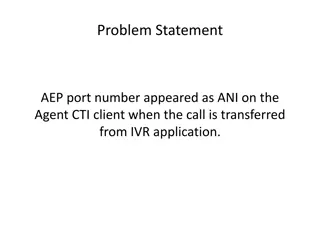
Update on IR Issues in Local Government Management Agency - ECJ Case C-518/15
The European Court of Justice ruled on questions regarding working time and rest periods for firefighters, specifically addressing stand-by time spent at home. The court's decision outlined implications for both retained and full-time fire services, emphasizing the classification of stand-by time as working time. This ruling has significant implications for the organization of fire services and sustainability concerns.
Download Presentation

Please find below an Image/Link to download the presentation.
The content on the website is provided AS IS for your information and personal use only. It may not be sold, licensed, or shared on other websites without obtaining consent from the author. If you encounter any issues during the download, it is possible that the publisher has removed the file from their server.
You are allowed to download the files provided on this website for personal or commercial use, subject to the condition that they are used lawfully. All files are the property of their respective owners.
The content on the website is provided AS IS for your information and personal use only. It may not be sold, licensed, or shared on other websites without obtaining consent from the author.
E N D
Presentation Transcript
Update on IR issues Eamonn Hunt Assistant Chief Executive Officer Local Government Management Agency 16th October, 2018
Ville de Nivelles v Matzak (ECJ Case C-518/15) In February this year, the Court of Justice of the European Union delivered a verdict in favour of a Belgian volunteer firefighter regarding home-based on-call time. In its ruling, the Court stated that stand-by time which a worker spends at home with the duty to respond to calls from his employer within 8 minutes, very significantly restricting the opportunities for other activities, must be regarded as working time . Key issues working time & rest periods Challenge in terms of sustainability and organisation of retained fire services Has implications for full time fire services
The decision The following questions were referred to the ECJ for a preliminary ruling 1) Must Article 17(3)(c)(iii) of Directive 2003/88 be interpreted as meaning that the Member States may derogate, with regard to certain categories of firefighters recruited by the public fire services, from all the obligations arising from the provisions of that directive, including Article 2 thereof, which defines, in particular, the concepts of 'working time' and 'rest periods'; 2) Must Article 15 of Directive 2003/88 be interpreted as meaning that it permits Member States to maintain or adopt a less restrictive definition of the concept of 'working time' than that laid down in Article 2 of that directive; 3) Must Article 2 of Directive 2003/88 be interpreted as meaning that it requires Member States to determine the remuneration of periods of stand-by time such as those at issue in the main proceedings according to the classification of those periods as 'working time' and 'rest period'; 4) Must Article 2 of Directive 2003/88 be interpreted as meaning that stand-by time which a worker spends at home with the duty to respond to calls from his employer within 8 minutes, very significantly restricting the opportunities for other activities, must be regarded as 'working time'. The court ruled on each question as follows: 1) No 2) No 3) No 4) Yes
Organisation of Working Time Directive Article 2 Definitions For the purposes of this Directive, the following definitions shall apply: working time means any period during which the worker is working, at the employer's disposal and carrying out his activity or duties, in accordance with national laws and/or practice; rest period means any period which is not working time; adequate rest means that workers have regular rest periods, the duration of which is expressed in units of time and which are sufficiently long and continuous to ensure that, as a result of fatigue or other irregular working patterns, they do not cause injury to themselves, to fellow workers or to others and that they do not damage their health, either in the short term or in the longer term. Article 3 Daily rest Member States shall take the measures necessary to ensure that every worker is entitled to a minimum daily rest period of 11 consecutive hours per 24-hour period.
Organisation of Working Time Directive Article 4 Breaks Member States shall take the measures necessary to ensure that, where the working day is longer than six hours, every worker is entitled to a rest break, the details of which, including duration and the terms on which it is granted, shall be laid down in collective agreements or agreements between the two sides of industry or, failing that, by national legislation. Article 5 Weekly rest period Member States shall take the measures necessary to ensure that, per each seven-day period, every worker is entitled to a minimum uninterrupted rest period of 24 hours plus the 11 hours' daily rest referred to in Article 3. If objective, technical or work organisation conditions so justify, a minimum rest period of 24 hours may be applied. Article 6 Maximum weekly working time Member States shall take the measures necessary to ensure that, in keeping with the need to protect the safety and health of workers: (a) the period of weekly working time is limited by means of laws, regulations or administrative provisions or by collective agreements or agreements between the two sides of industry; (b) the average working time for each seven-day period, including overtime, does not exceed 48 hours.
Organisation of Working Time Directive Article 15 More favourable provisions This Directive shall not affect Member States' right to apply or introduce laws, regulations or administrative provisions more favourable to the protection of the safety and health of workers or to facilitate or permit the application of collective agreements or agreements concluded between the two sides of industry which are more favourable to the protection of the safety and health of workers. Article 17(3)(c)(iii) In accordance with paragraph 2 of this Article derogations may be made from Articles 3, 4, 5, 8 and 16: (c) in the case of activities involving the need for continuity of service or production, particularly: (iii) press, radio, television, cinematographic production, postal and telecommunications services, ambulance, fire and civil protection services; (iv) gas, water and electricity production, transmission and distribution, household refuse collection and incineration plants; (v) industries in which work cannot be interrupted on technical grounds; (vi) research and development activities; (vii) agriculture; (viii) workers concerned with the carriage of passengers on regular urban transport services;
Organisation of Working Time Directive In implementing the Organisation of Working Time Act the Irish Government issued regulations which it believed were appropriate under Article 17(3)(c)(iii) these were S.I. No. 21/1998 - Organisation of Working Time (General Exemptions) Regulations, 1998. which provide that the provision of ambulance, fire and civil protection services are specifically exempted from section 11, 12, 13 or 16 of the Organisation of Working Time Act.
Organisation of Working Time (General Exemptions) Regulations, 1998 In implementing the Organisation of Working Time Act the Irish Government issued regulations which it believed were appropriate under Article 17(3)(c)(iii) these were S.I. No. 21/1998 -. which provide that the provision of ambulance, fire and civil protection services are specifically exempted from section 11, 12, 13 or 16 of the Organisation of Working Time Act.
Organisation of Working Time Act Section 11. Daily rest period An employee shall be entitled to a rest period of not less than 11 consecutive hours in each period of 24 hours during which he or she works for his or her employer. Section 12. Rests and intervals at work (1) An employer shall not require an employee to work for a period of more than 4 hours and 30 minutes without allowing him or her a break of at least 15 minutes. (2) An employer shall not require an employee to work for a period of more than 6 hours without allowing him or her a break of at least 30 minutes; such a break may include the break referred to in subsection (1). (4) A break allowed to an employee at the end of the working day shall not be regarded as satisfying the requirement contained in subsection (1) or (2).
Organisation of Working Time Act 13. Weekly rest periods (1) In this section daily rest period means a rest period referred to in section 11. (2) Subject to subsection (3), an employee shall, in each period of 7 days, be granted a rest period of at least 24 consecutive hours; subject to subsections (4) and (6), the time at which that rest period commences shall be such that that period is immediately preceded by a daily rest period. (3) An employer may, in lieu of granting to an employee in any period of 7 days the first- mentioned rest period in subsection (2), grant to him or her, in the next following period of 7 days, 2 rest periods each of which shall be a period of at least 24 consecutive hours and, subject to subsections (4) and (6) (a) if the rest periods so granted are consecutive, the time at which the first of those periods commences shall be such that that period is immediately preceded by a daily rest period, and (b) if the rest periods so granted are not consecutive, the time at which each of those periods commences shall be such that each of them is immediately preceded by a daily rest period.
Organisation of Working Time Act Section 16 2) Without prejudice to section 15 , an employer shall not permit a night worker, in each period of 24 hours, to work a) in a case where the work done by the worker in that period includes night work and the worker is a special category night worker, more than 8 hours (b) in any other case, more than an average of 8 hours, that is to say an average of 8 hours calculated over a period (hereafter in this section referred to as a reference period ) that does not exceed 2 months, or such greater length of time as is specified in a collective agreement that for the time being has effect in relation to that night worker and which stands approved of by the Labour Court under section 24 .
Key Sections 15. Weekly Working Hours (1) An employer must not permit an employee to work, in each period of 7 days, more than an average of 48 hours, that is to say an average of 48 hours calculated over a period (hereafter in this section referred to as a reference period ) that does not exceed (a) 4 months, or (b) 6 months (i) in the case of an employee employed in an activity referred to in paragraph 2, point 2.1. of Article 17 of the Council Directive, or (ii) where due to any matter referred to in section 5, it would not be practicable (if a reference period not exceeding 4 months were to apply in relation to the employee) for the employer to comply with this subsection, or (c) such length of time as, in the case of an employee employed in an activity mentioned in subsection (5), is specified in a collective agreement referred to in that subsection.
Organisation of Working Time Act maximum average net weekly working time of 48 hours A daily rest break of 11 consecutive hours rest breaks while at work a weekly rest break of 24 consecutive hours maximum average night working of 8 hours
Direct Effect This doctrine allows citizens of an EU Member State to rely directly on a Directive before national courts, even if it has not been transposed into national law. Such direct reliance is permitted if the rights or obligations contained in the Directive are sufficiently precise and unconditional to be capable of being directly applied. In other words, a provision can have direct effect if its characteristics are such that it is capable, as it is, of judicial adjudication. A further feature of the doctrine of directs effect is that a rule or a provision in a Directive can only be relied upon against the State which has failed to implement it and not against a non-State entity or individual (Case C 452/84 Marshall v South Hampton and South West Hampshire Area Health Authority [1986] E.C.R. 723). The ECJ has taken a broad view of what is meant by the state and has applied the rule of direct effects to emanations of the state .
Retained Fire Service Engagement with SIPTU at WRC Extension of retirement age from 58 to 60 Review of Occupational Health scheme Rates of pay for Public holidays, Force majeure, etc
Retained Fire Service Application of provisions of the Public Service Management (Sick Leave) Regulations 2014 (S.I. 124 of 2014) 7 days self certified sick leave 92 calendar days (3 months) on full pay in a rolling 1 year period followed by 91 calendar days (3 months) on half pay subject to:-, a maximum of 183 calendar days in a rolling 4 year period. What is full pay? Retainer yes, Drills?, Calls?
Retained Fire Service Driver Mechanic Role Grievance and Disciplinary Code Time and Attendance Garda Vetting
Full Time Fire Service Grievance and Disciplinary Code Garda Vetting Occupational Health Scheme Retirement Age
Disciplinary matters An employer must: must set out the facts of the events leading to the dismissal including, where relevant, disciplinary meeting(s) held, investigation undertaken, disciplinary hearing(s) conducted, internal appeal(s) conducted.
Disciplinary matters Terms of reference Local Authority policies Confidentiality Deal with the issue in a timely fashion






















